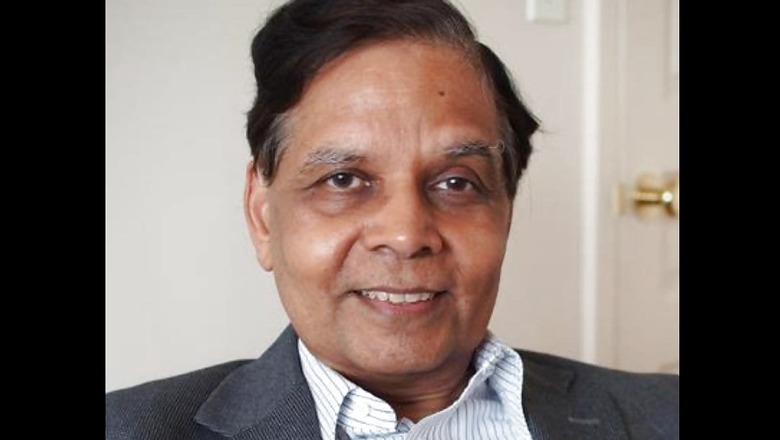
views
Indian-American economist and former NITI Aayog vice chairman Arvind Pangariya says that while privatisation invites skepticism, the Centre’s focus on it now is of the same magnitude as that of the government of India in 1992. He espoused the idea of a “separate privatisation ministry”.
In an exclusive interview with CNN-News18, Pangariya talks about job-creation in a post-pandemic world, his views on the recent Budget, and much more.
Edited excerpts from the interview:
Q: Many economic and market experts were saying that so far the successive budgets by the BJP-led NDA government was not bold on reforms. In fact, some of announcements in the previous budget were seen as populist. Will you say that this budget 2021 coming in the times of pandemic has attempted to take the Bull by the horns – be it the question of growth, boosting infrastructure, or tackling the fiscal deficit?
A: This is a watershed budget. It really takes on every reform that we have been asking for. And its not just through the budget, but reforms have also already been carried out, such as labour reforms, or farm laws and medical reforms. The candidate Modi that we saw in 2014 is at its full fledge in Modi 2.0.
Q: I am going to talk about reforms in just a bit, because we are seeing the politics of reforms playing out, but a little bit more about the budget because privatisation has got a major push in this time. Many are saying that it is the most ambitious plan since Vajpayee’s era. What do you think about that? Nirmala Sitharaman has announced 1.75 lakh crore as the disinvestment target for the fiscal year of 2021-2022 again; a huge amount. How realistic is this target?
A: Skepticism gets expressed regarding privatisation. Privatisation has been the government’s own agenda since 2016. While I was at Niti Aayog, the PMO supported us in many things that needed to be privatised. This is a little different from what it was earlier. The policy now is as of the same magnitude that the government of India announced in 1992. The government is saying this is my policy and not just saying we want to do it. I feel like now we need a separate privatisation ministry.
Q: Yes, because you have talked about that it, that it would make you happy if India actually has a separate disinvestment ministry. The one we saw during the Vajpayee era. Can the Modi government really implement it? They have created very interest-specific or focus-specific ministries be it skill development or even the Jal ministry which is to do with the Ganga ambition.
A: In terms of implementation, this is the best government that we have. The Modi government can implement this. I never thought Swachch Bharat would do such good but PM Modi made it successful.
Q: Is India really in a position to turn the tables when it comes to the higher fiscal deficit figures? A higher fiscal deficit is not just the government’s headache, it also impacts our financial lives.
A: By and large in the past six years this government has been very conservative to fiscal deficit target. I support what the government has done on the fiscal front. People are now returning to work and now spending money also. What will happen we have to see. I expect this to boost our growth. If the government delivers what it promised, then growth will go above 8%. Growth will be powerful, if we are able to lower the debt. The government says we have a consolidation plan, we will see deficit coming down.
Q: You just mentioned that India could easily achieve over 8% growth in next 2 decades following Covid-19. Given the momentum we have maintained, and we contain expenditure going forward. Where do you see scape for expenditure cut. The wastage or leakage, if any?
A: The scope for cutting expenditures is shrinking because the government is doing a better job of plugging the leakages. The whole area of public distribution system is still the same. The government has a large number of centrally-sponsored schemes, these need to be revisited. We never close any scheme once its open it remains open. There should be an audit done by a set of experts which tells which scheme is supposed to continue till when, and it will make our expenditure come down. These are things which I think the government can do.
Q: I am going to talk about the political-hot potato right now here in India; while budget announcements have been largely welcomed by experts the problem many argue is getting these ideas and announcements to see the light of the day. We are witnessing massive protests against the farm laws which have been touted as a landmark reform by many, including you. How can you separate good economics from politics in a democracy like ours?
A: We can never separate politics from good economics. Sometimes there is uncertainty but that doesn’t mean we will sit back and do nothing. That’s what we have been hearing in UPA: that there is no consensus. We have done a large number reforms in the last 30 years. This is the largest protest to any reform. The opposition is coming from mainly two states, which is not all of India. Most states have welcomed the reforms. The government is working on to resolve it soon. Overall we have done pretty well.
Q: How do you find the political solution? Finding political solution requires getting the state chief ministers on board because of course we are seeing a law and order situation that emerged because of the Republic day parade and the vandalism that happened. Both Delhi borders have been petrified because there is an another anticipation. My question is that how do you implement this and look for a political solution because the farmers have taken maximalist position and the opposition parties are backing the farmers saying that they would also want complete roll back of these reforms.
A: It’s something the PM and his cabinet have to navigate. All I can say is that the government has shown good flexibility at the point of postponing the laws for more than a year. Sometimes compromise has to be made to reach an agreement. It’s something the government has to do.
Q: 1991 was a year when India badly needed economic reforms, are we in the same situation right now? Are the farm reforms almost like a 1991-moment for agriculture reforms, or will you be giving a new phrase to it?
A: 1991 was a good moment because that was beginning of reforms. The reforms that happened in the last five years are some of the toughest reforms. Labour law reforms, Modi government has done it. We changed the entire policy frame work. From planned economy, we became a market economy. For how long does the poor farmer has to wait to get his right to sell his produce at his own terms. Reform has to happen and we certainly cannot undermine the interest of farmers in 27 other states because two states oppose it. China has done so many reforms. Reform has to be done and economy has to grow, how long do we have to wait.
Q: Will you say that given the nature of political opposition that is in our country at this juncture, what will be his (Modi’s) ranking in the category of reformist Prime Ministers. Will you be saying that he is like Mr Narsimha Rao and Atal Bihari Vajpayee, or will you rank him above them?
A: If I was to write a book on the makers of new India, then those three PMs will be the defining PM of that book.
Q: How do you arrive at this conclusion, seeing the challenge right now, particularly once-in-a-century pandemic makes it more difficult for PM Modi?
A: It’s not just pandemic but what makes it more difficult is that you always to try to pluck low hanging fruits and by the time Modi came, all those fruits were already harvested. Modi has a tough task of doing reforms which were the toughest to do. The discussion on farm laws started in Atal ji’s government. Modi has said if the constitution allows to do then why not do it, everybody wants to pluck the lowest-hanging fruit first.
Q: Can we really get to the five trillion target that has been set by the Prime Minister and is this the first time that India is showing a definitive economic vision and following a well-calibrated growth strategy. And how is it really a departure from the past?
A: PM Modi has a vision I can tell you that. This budget tells me that he is laying down the roadmap for the next five years to come. Privatisation of banks like companies. Very big progress in infrastructure like rails roads. He is really building India. He thinks that defense has to be looked at differently. Geographically, he has a vision. He is clear that he also wants to do things for east India and not just North India. Before he even became PM he felt that East India needs more attention. He thinks holistically, operates a little different from previous leaders.
Q: There is criticism that is coming from the opposition that this is the government that is selling assets. Also, the other focus is mainly on infrastructure development which has been the big focus in this election. Will it really address the issue of jobs in the short to medium run because of the massive job losses that we have seen?
A: In the short run, infrastructural development has to be done because it is labour intensive. So, it is the right kind of expenditure. In the longer run, private sector has to do its bit and provide jobs. The government can be held responsible for good or bad policies but the job creation is up to private sector. If the private sector says we can’t give jobs because of some policy, then tell this to the government. It is not the government’s job to create jobs.
Q: And what do you think of the opposition’s views on the budget?
A: This is all shenanigans in my view, the government never sells assets, it just swaps assets to create other assets. If you spend on education it means you are building human capital which is also an asset. By swapping the assets, the government is doing the right thing. It is not for govt to do manufacturing activity. That’s done best by the private sector. Infrastructure or health is clearly the government’s job. How the government is going to do it we will see, if the government lacks resources then what can be done.
Read all the Latest News, Breaking News and Coronavirus News here

















Comments
0 comment